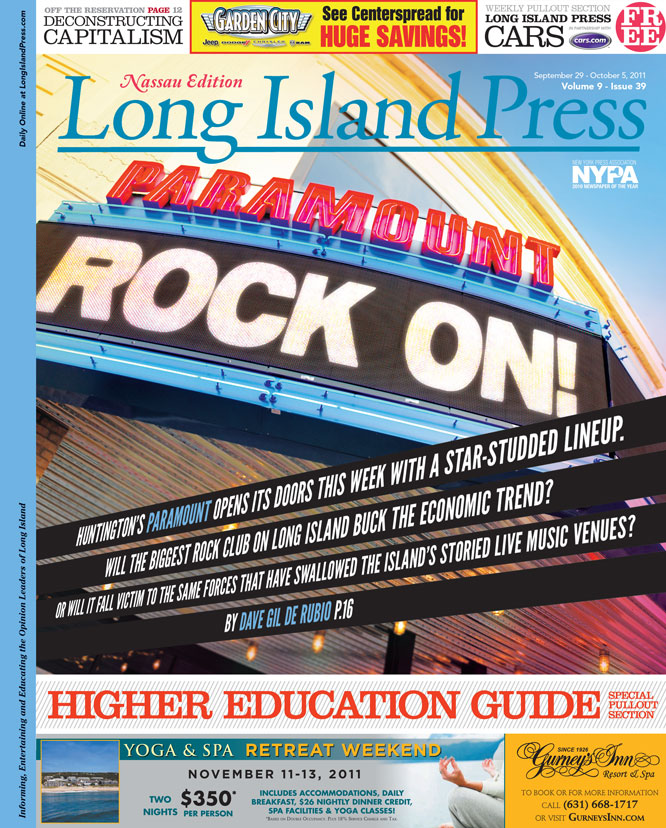When I met my wife, Eden White, she was a decade into a musical career as a Manhattan-based singer-songwriter. She had already broken through journeyman status and was headlining credible East Coast marquees such as the Bottom Line in NYC and even caught the attention of Billboard Magazine, who cast her as “a female Billy Joel.” This was due, in large part, to her proficiency as a piano player and her ability to weave epic storylines with complex rhythms and incredible musicianship into an accessible pop-style presentation.
At this point I will refrain from delving into her career any further, as she will undoubtedly change the locks on our home. But this introduction is more than anecdotal; it is necessary to understand why, when we were first dating, we were emboldened enough to hand-deliver an invitation to Billy Joel’s East End office inviting him to attend Eden’s performance at The Stephen Talkhouse in Amagansett. In our hearts, we believed our mission was folly, but it was a wonderful excuse to drive to the Hamptons early and go “Billy Bombing” as my mother calls it.
The purpose of the Talkhouse gig was to work out unreleased material to a small group of loyal fans; by nightfall the thought of our mission to lure Billy Joel to the venue quickly gave way to the normal pre-show nerves and commotion. It was Timothy White (no relation), the erstwhile editor of Billboard, who first made the comparison between Eden and Billy Joel. He loved her music and remained a devoted fan of hers until he passed away a few years ago. He saw in her, as many did, a return to real songwriting and storytelling that seemed to have disappeared throughout the ’80s and ’90s.
As the crowd filed in, Eden disappeared with her band and ceremonial calming agent—a single glass of red wine—to the green room above the stage as the rest of us waited patiently for the show to begin.
And then it happened.
A stocky and somewhat nondescript man in a baseball cap, overcoat and wearing a full beard walked through the door just before the performance. Stopping a few feet inside the entrance to greet a familiar face he then quickly disappeared upstairs. Later I would learn that as Billy Joel casually strode into the green room, Eden’s band fell silent, leaving Joel to break the silence by introducing himself and thanking them for the invitation. He apologized in advance that he would be unable to stay for the entire performance but sat with the band for nearly 10 minutes engaging in conversation about music and performance before shuffling down the stairs and sitting alone at a table near the stage.
It was impossible to ignore his presence. I think everyone was waiting for the awkward moment when he would make a quick exit during the show but that moment never came. He stayed for the duration. Afterwards he thanked her for bringing him back to the ephemeral yet intoxicating feeling of playing before an intimate audience, leaving nothing on the stage at the end of a gig and playing music for the sake of playing music. She delivered the Piano Man back to Oyster Bay where he was Billy the Kid once again. Such a simple and beautiful thing it is to give someone the gift that they have been giving to millions for so long; so long, in fact, that we are no longer able to separate the gift from the giver, the music from the man. And what a staggeringly generous gift it was for him to offer his time and his praise so selflessly to another artist.
Critics, reviewers and musical historians may marginalize Billy Joel’s contribution to rock ’n’ roll but in this regard I tend to side with H.L. Mencken, who viewed criticism as a “plainly inferior business” and considered the reviewer himself “as hollow as a jug” and with nothing “in him save the ghostly echoes of other men’s thoughts and feelings.” Egads. OK, perhaps I have a little more respect for criticism. Nevertheless, in the case of Billy Joel, he is immortal in my book for two reasons.
The first is, I will be forever grateful for this encounter merely for the fact that he didn’t speed away with my girlfriend on the back of his motorcycle. (Listen, it’s not like he hasn’t done that before, so I had every right to be wary.) The second is his quiet, unwavering dedication to Long Island. He honored us by including the Island in his lyrics, standing up for the suburbs and fighting for our fishermen. He was the American musical face of glasnost and the leather face of the Downeaster “Alexa.” We witnessed him work through several peccadilloes like failed marriages, incidents behind the wheel and collaborating with Twyla Tharp, only to rebound and walk among us at festivals and boat shows. Through it all, he’s never left us.
If you wish to comment on “Off the Reservation,” send your message to [email protected]





